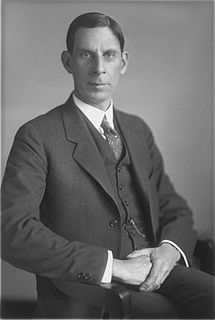A Quote by Sam Keen
Our society has been eaten up by the economic view of things, which routinely forces us to work at jobs that don't mean anything.
Related Quotes
Anarchism is a definite intellectual current in the life of our times, whose adherents advocate the abolition of economic monopolies and of all political and social coercive institutions within society. In place of the present capitalistic economic order Anarchists would have a free association of all productive forces based upon co-operative labour, which would have as its sole purpose the satisfying of the necessary requirements of every member of society, and would no longer have in view the special interest of privileged minorities within the social union.
There are always forces at work in a society, certainly in America, which are really forces of censorship -either religious bodies or zealots who are always putting pressure on things, whether it's books or art or film. And all art is fundamentally subversive, because it upsets people's perceptions, their notions about society. Therefore, art is dangerous, but good art is always making us reassess our thoughts and feelings about how we relate to other people. There are always people who fear that and want to suppress that.
If we feel that any habit or pursuit, harmless in itself, is keeping us from God and sinking us deeper in the things of earth; if we find that things which others can do with impunity are for us the occasion of falling, then abstinence is our only course. Abstinence alone can recover for us the real value of what should have been for our help but which has been an occasion of falling. ... It is necessary that we should steadily resolve to give up anything that comes between ourselves and God.
In view of the importance of philanthropy in our society, it is surprising that so little attention has been given to it by economic or social theorists. In economic theory, especially, the subject is almost completely ignored. This is not, I think, because economists regard mankind as basically selfish or even because economic man is supposed to act only in his self-interest; it is rather because economics has essentially grown up around the phenomenon of exchange and its theoretical structure rests heavily on this process.
The myth of self-sufficiency blinds us to the workings of other forces in family life. For families are not now, nor were they ever, the self-sufficient building blocks of society, exclusively responsible, praiseworthy, and blamable for their own destiny. They are deeply influenced by broad social and economic forces over which they have little control.
We must ask whether our machine technology makes us proof against all those destructive forces which plagued Roman society and ultimately wrecked Roman civilization. Our reliance - an almost religious reliance - upon the power of science and technology to forever ensure the progress of our society, might blind us to some very real problems which cannot be solved by science and technology.
I've apparently been the victim of growing up, which apparently happens to all of us at one point or another. It's been going on for quite some time now, without me knowing it. I've found that growing up can mean a lot of things. For me, it doesn't mean I should become somebody completely new and stop loving the things I used to love. It means I've just added more things to my list.
For example, the supporters of tariffs treat it as self-evident that the creation of jobs is a desirable end, in and of itself, regardless of what the persons employed do. That is clearly wrong. If all we want are jobs, we can create any number--for example, have people dig holes and then fill them up again, or perform other useless tasks. Work is sometimes its own reward. Mostly, however, it is the price we pay to get the things we want. Our real objective is not just jobs but productive jobs--jobs that will mean more goods and services to consume.
Unless we do change our whole way of thought about work, I do not think we shall ever escape from the appalling squirrel-cage of economic confusion in which we have been madly turning for the last three centuries or so, the cage in which we landed ourselves by acquiescing in a social system based upon Envy and Avarice. A society in which consumption has to be artificially stimulated in order to keep production going is a society founded on trash and waste.
Now it is unambiguously clear that trickle-down economics does not work. But what does that mean? That means we have to structure our economic policies to make sure that we have shared prosperity. And you don't do that by giving a tax cut to the big winners and raising taxes on those who have not done very well. Your economic policy has to respond to the way our economic system has been working.
The pace of science forces the pace of technique. Theoretical physics forces atomic energy on us; the successful production of the fission bomb forces upon us the manufacture of the hydrogen bomb. We do not choose our problems, we do not choose our products; we are pushed, we are forced -- by what? By a system which has no purpose and goal transcending it, and which makes man its appendix.
It is common talk that every individual is entitled to economic security. The only animals and birds I know that have economic security are those that have been domesticated--and the economic security they have is controlled by the barbed-wire fence, the butcher's knife and the desire of others. They are milked, skinned, egged or eaten up by their protectors.
Our mother always taught us to be in control of our voice and our bodies and our work, and she showed us that through her example. If she conjured up an idea, there was not one element of that idea that she was not going to have her hand in. She was not going to hand that over to someone. And I think it's been an interesting thing to navigate, especially watching you do the same in all aspects of your work: Society labels that a control freak, an obsessive woman, or someone who has an inability to trust her team or to empower other people to do the work, which is completely untrue.


































